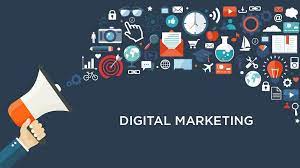example
Digital marketing refers to the promotion and advertising of products, services, or brands using various online channels and technologies. It encompasses a wide range of strategies and tactics aimed at reaching and engaging a target audience through digital mediums such as websites, search engines, social media, email, mobile apps, and more. Digital marketing has become increasingly important in the modern business landscape as more and more people rely on the internet and digital devices for information, entertainment, and commerce.
Some common components of digital marketing include:
Search Engine Optimization (SEO): The process of optimizing a website or web pages to improve their visibility and ranking in search engine results pages. SEO involves various techniques to enhance the website's relevance, authority, and user experience, ultimately driving organic (unpaid) traffic.
Search Engine Marketing (SEM): This includes paid advertising on search engines like Google, commonly known as pay-per-click (PPC) advertising. Advertisers bid on keywords relevant to their business, and their ads appear on search engine results pages when users search for those keywords. Advertisers only pay when someone clicks on their ads.
Social Media Marketing: Leveraging social media platforms like Facebook, Instagram, Twitter, LinkedIn, and others to connect with the target audience, build brand awareness, engage users, and drive traffic to websites or landing pages. Social media marketing involves creating and sharing content, running paid ads, and interacting with followers.
Content Marketing: Creating and distributing valuable and relevant content to attract and engage a target audience. Content can be in various formats, such as blog posts, articles, videos, infographics, ebooks, and more. The goal of content marketing is to establish authority, build trust, and generate leads or conversions.
Email Marketing: Utilizing email to communicate with prospects and customers. Email marketing involves sending targeted messages, such as newsletters, promotional offers, event invitations, and follow-up emails, to build relationships, drive traffic, and encourage conversions.
Influencer Marketing: Collaborating with influential individuals or online personalities (influencers) who have a significant following and influence in a particular niche. Brands partner with influencers to promote their products or services to their followers, leveraging the trust and credibility the influencers have built.
Mobile Marketing: Targeting mobile device users through mobile-optimized websites, mobile apps, SMS (text) marketing, and location-based marketing. Mobile marketing recognizes the prevalence of smartphones and tablets and aims to reach users on their mobile devices.
Analytics and Tracking: Monitoring and analyzing the performance of digital marketing campaigns using various tools and platforms. This allows marketers to measure key metrics, gain insights, and make data-driven decisions to optimize their strategies.
Digital marketing offers businesses numerous benefits, including broader reach, targeted audience segmentation, cost-effectiveness, real-time data analysis, and the ability to adjust strategies quickly. However, it is a rapidly evolving field that requires staying updated with the latest trends, technologies, and best practices to effectively reach and engage the target audience in an ever-changing digital landscape.


